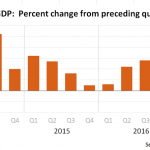The year was 1932. Leon Trotsky had been already been tossed out of the Communist Party and exiled from Stalin’s Soviet Union. Writing from a distance, he found himself performing a balancing act: on one side, supporting the broad idea of the Revolution and the ultimate victory of socialism; on the other side, criticizing the first five-year economic plan as poorly designed and replete with failures. In his October 1932 essay, “The Soviet Economy in Danger,” Trotsky finds himself arguing that Soviet bureaucrats were far too confident about economic central planning, and instead needed to rely more on prices and supply and demand.
Here are some snippets from Trotsky, which include a number of phrases and sentences that could have been written by a fierce critic of socialism like Friedrich Hayek. Trotsky’s concerns include: the large costs of mistakes in centralized decision-making, problems in which quality of output is sacrificed in the drive for greater quantity, lack of coordination across production chains in the economy, how bureaucrats lack a “universal mind” and thus need to rely on supply and demand and “commercial relations.” Of course, for Trotsky, all of this just proves that socialism is working.
“Even though the first five-year plan took into consideration all possible aspects, by the very nature of things it could not be anything but a first and rough hypothesis, destined beforehand to fundamental reconstruction in the process of the work. It is impossible to create a priori a complete system of economic harmony. The planning hypothesis could not but include old disproportions and the inevitability of the development of new ones. Centralized management implies not only great advantages but also the danger of centralizing mistakes, that is, of elevating them to an excessively high degree. …
“The administrative hue and cry for quantity leads to a frightful lowering of quality; low quality undermines at the next stage the struggle for quantity; the ultimate cost of economically irrational “successes” surpasses as a rule many times the value of these same successes. Every advanced worker is acquainted with this dialectic, not through the books of the Communist academy (alas! more inferior goods), but in practice, through experience in their own mines, factories, railroads, fuel stations, etc. … If we were to introduce a corrective coefficient for quality into the official data, then the indices of the fulfilment of the plan would immediately suffer substantial drops. …













Leave A Comment